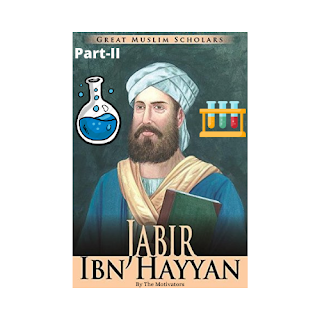THE LOTTERY THAT JABBIR INVENTED HAD TWO PARTS (JABBIR IBN HAYYAN)
Part-ii
He wrote a
detailed and thought-provoking essay on Jabbir’s circumstances and writings in
the January 1925 issue of the journal Science Progress, and argued that Jabbir was
the same person whom scholars in Latin call Geber. He also wrote that all the
books attributed to Gaber's name are translations of the books of this famous,
proud, single-minded Iraqi author. Could be Literature in favor of Bertha Lot
was published for a hundred years, but still no one was able to prove his false
claim. He also wrote that all the books attributed to Gaber are translations of
the books of this famous, proud, single-minded Iraqi author. Scholars then set
out on a quest to find books or manuscripts that would substantiate this
assumption. Literature in favor of Bertha Lotte continued to be published for
over a hundred years, but no one was able to substantiate her claim
Authors:
Jabbir was not
only a chemist but also possessed power over various sciences and arts. Every
aspect of his personality added four moons to his greatness and fame. Apart
from alchemy, Jabbir was a master of the fields of philosophy, mathematics,
medicine and wisdom, rationality, astronomy and astronomy, physics, physiology,
magic and sorcery. Zakaria al-Razi wrote many of Jabbir’s books.
Jabbir was a
researcher of chemistry and inventor of numerous chemical compounds. He
authored more than 100 masterpieces on alchemy and published pamphlets. The
list of which Ibn Al-Nadim has given in his book Afaq Kitab. His translated
books include Kitab al-Mulk (Book of kingdom) and Kitab al-Riyadh (Book of balance)
and Book of Eastern Mercury in English.
The translator of these three books was the European scholar M.
Berthelot. According to Professor Hatti, Jabbir Ibn Hayyan's books had a
profound effect on the science of chemistry in Europe and Asia. His book
Alchemy was translated into Latin by Robert of Chester in 1144. The Book of the
Seventh was translated by Gerard of Cremona in 1187. This book mentions 70
chemical techniques. Jabir was the scientific advisor of Caliph Harun al-Rashid
for whom he wrote the book Al-Zahra.
He used
steganography in such a secret language in the book Al-Ahjar that only a person
who is a Buddhist in alchemy can understand the things given in it. He used
symbols in the book, the literal meaning of which is difficult to know.
The
book Al-Arba'een covers all the theoretical and esoteric sciences in the light
of its philosophical basis.
Jabbir Mystery
of Alchemy was translated into Latin in the thirteenth century, Summa perfectionism
magisteri. According to George Sarton, the book became so popular in medieval
Europe that it soon became a textbook for alchemy. The book was written in such
simple words that a book like this could not be written for many centuries. It
was first printed in modern press from Rome in 1481. The first Italian
translation of the book was made in 1510, based on a draft of the book in the
Vatican (Italy). The book was published in Leiden (Netherlands) in 1685 and by
Danzig in 1682. Latin translations of Jabbir’s four books were also published
in one volume.
That is:
·
Jabbir
invented a number of chemical terms that later became part of scientific
terminology in several European languages.
· Jabbir
was the first chemist to say that metals differ from each other because of
their different sulfur and mercury ratios. Many technical terms in alchemy have
Persian names, such as Zebak (Mercury) and Naushadr (Sal Ammonic).
This shows that
Iranian alchemists also had a hand in the development of medieval alchemy.
German scholar Ruska Ruska says that the first person to experiment with Alzheimer's
was Arius, a native of Iran. Iris said that man has the ability to imitate the
works of nature.
Holmyard, a Western writer, says that Jabbir has the same
importance and place in the history of alchemy as the British chemist Robert
Boyle and the French scientist Antoine Lavoisier. Max Meyerhof says: Berthelot,
a French researcher and author, objected that Jabbir’s books did not contain
prescriptions for making material objects. Prof. Ahmad Hassan, after a careful
study of 59 manuscripts of Jabir's books, said that this is a completely
misrepresentation. It contained prescriptions for dyeing glass, making
artificial pearls and improving their color, as well as prescriptions for a
number of industrial products. Kitab al-Khawas al-Kabeer contained prescriptions
for various chemicals and products, such as extracting salt from seawater,
casting it with a steel tripod, making ginger cinnabar, cosmetic prescriptions
such as removing hair from the body, and scalp hair. Gold coloring, coloring
the bride's hands with different colors, making varnishes and paints and water
proofing, making different colored inks.
The following books by Jabbir are available in the US National Library of Medicine, Maryland: Kitab al-Malagham al-Awal, al-Thani, al-Thalis, Tafsir Kitab al-Malagham, Kitab al-Tadabir, Kitab al-Mawazan, Kitab al-Asool, Kitab al-Sar-e-Sar-ul-Israr, Muntakhab min Kitab al-Ittihad Kitab al-Wahid, Kitab Tafsir al-Khamair, Kitab al-Bahir, Kitab al-Sha'r, Kitab al-Khamair al-Thalat, Kitab al-Khalis al-Mubarak NLM,NIH<GOV/hmd/ arabic. The books written by Muslim scholars on the subject of chemistry have been described by Professor Nasr in his book Islamic Science. Ibn Wahshiyah Kitab Usul Al-Kabeer, Ibn Muskawa's books, Abu Muslimah Majriti Ratbat Al-Hakim and Ghayat Al-Hakim (this is a different scientist from Abu Al-Qasim Majriti), Abu Al-Qasim Kushiri, Abu Al-Hasan Jayani Shazur Al-Dhahab , Abu al-Qasim Iraqi Kitab al-Ilm al-Muktasib fi Ziyadat al-Dhahab, Izz al-Din Ida Moor volume of Nahayat al-Talib Sharh al-Ilm al-Muktasab.


